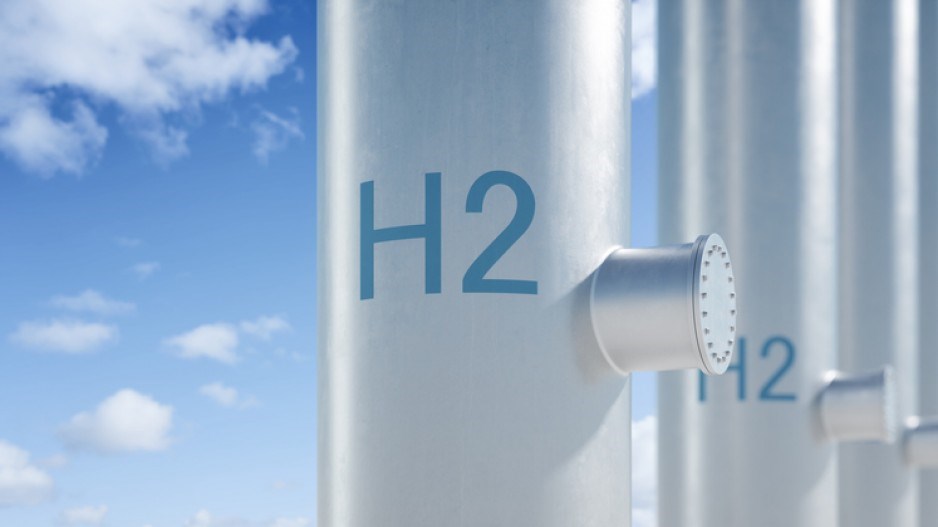The latest gathering between Canada’s western provinces and Asia about collaborating on building a hydrogen economy reveals two facts: Both sides want it, and neither side is ready to say what “it” means.
B.C. and Alberta representatives joined their South Korean counterparts on April 12 for the 2022 Korea-Canada Hydrogen Economy Forum, where the major Asian market made its case for working with Canadian stakeholders on developing the clean-burning fuel as a foundational piece of the shift towards a zero-emissions economy.
What the online gathering immediately showed is that – while both B.C. and Alberta are in the midst of pushes into the hydrogen market (including overtures to major Asian importers like South Korea) – their clean fuel visions are not in lockstep.
One fundamental difference is hydrogen production. Currently, the dominant way of producing hydrogen is burning fossil fuel (mostly natural gas) in “steam methane reforming.” While the process is cheaper than other production methods, experts say its carbon emissions far outsize the emissions from just burning natural gas as a fuel, which defeats the purpose of switching to hydrogen as a clean fuel.
But Alberta officials at the forum emphasized its plans to use carbon-capture (CCUS) extensively to eliminate emissions produced while making hydrogen from natural gas. The hydrogen produced this way – dubbed “blue hydrogen” versus “green hydrogen” produced by electrolysis of water molecules and bypassing fossil fuels – is the focus for fossil-fuels-rich Alberta, officials reiterated.
“Our starting point is the very large volume of hydrogen that can be produced from our natural resources plus CCUS,” said Brent Lakeman, hydrogen initiative director at Edmonton Global.
He also noted that the plan would be to make his city the hub of Canada’s hydrogen industry.
Barbra Korol, executive director of natural gas strategy at Alberta Energy, added that while Alberta is looking to develop its hydrogen industry, it is in conjunction with the fossil fuels base in the province – and, in some cases, to help the “greening” of traditional energy production.
Korol also believes Alberta’s large capacity for producing “blue hydrogen” would be very attractive for Asian markets like South Korea – and it would therefore make sense for B.C. to work together as a conduit to get the commodity to ports en route to Asia.
B.C., however, appears to be taking a fundamentally different position.
Chantelle Carden, senior policy analyst at the Energy and Decarbonization Branch of the B.C.’s Ministry of Energy and Mines, noted that the province’s hydrogen strategy, which was formulated last summer, champions its “CleanBC commitment” of decarbonizing the B.C. economy and accelerating the shift to clean technologies such as low-carbon hydrogen.
As such, she said that while there are some carbon-capture projects and other fossil-fuel-based hydrogen production being looked at, 90 per cent of the 40 projects that have been proposed for B.C. have been electrolysis-based, green-hydrogen production facilities.
Carden did not address how B.C.’s vision differs from Alberta’s. She instead emphasized that B.C.’s aim for hydrogen is decarbonization and for Metro Vancouver to be a hub for that production.
She added that the launch of B.C.’s Hydrogen Office on March 31 is a step towards lowering investment barriers to developing the sector in Metro Vancouver.
Jaehoon Lee, general manager of the Hydrogen Business Development Team at Korean utilities giant KOGAS, told the forum that the Korean government has directed industry to reduce CO2 emissions by 40 per cent by 2030, but added that, based on different supply-chain projections, it remains unclear what South Korea needs from Canada.
Lee outlined several hydrogen value chains as a demonstration – only one of which involved South Korea importing liquefied hydrogen from overseas, and then blending it into its natural gas supply to feed traditional gas power plants.
The other options used imported hydrogen converted into ammonia to be either used at coal-fire plants directly or reconverted into hydrogen for use in gas power plants or the skipping imported hydrogen altogether and instead importing LNG to produce “blue hydrogen” within Korea.
With all the uncertainty surrounding such a nascent global movement, the most confidence expressed – by a top Korean official – is on the need for Canada and Korea to work together to come to a resolution.
With that said, the fact that both Korean and B.C./Alberta sides of the equation recognize the hydrogen economy’s potential is an encouraging development despite the uncertainty of a match, said Jaedo Moon, chairman of H2Korea – the country’s lead promotion agency for the hydrogen economy.
“Hydrogen is one of the most promising energy sources in the era of decarbonization,” Moon said. “However, considering the various environmental, ecological and economic conditions of each country ... the formation of a global hydrogen economy cannot be achieved with the efforts of one country alone.
“It is necessary to establish a global co-operation system that can make use of [each country’s] strengths and complement weaknesses.”




